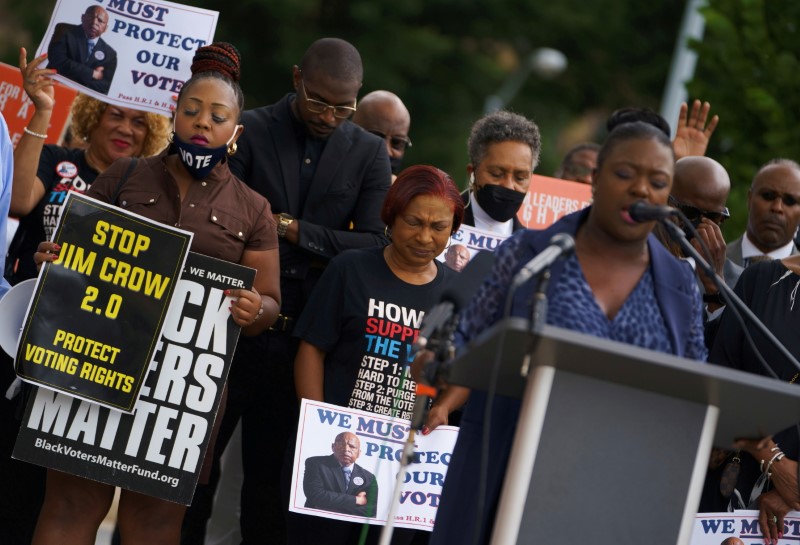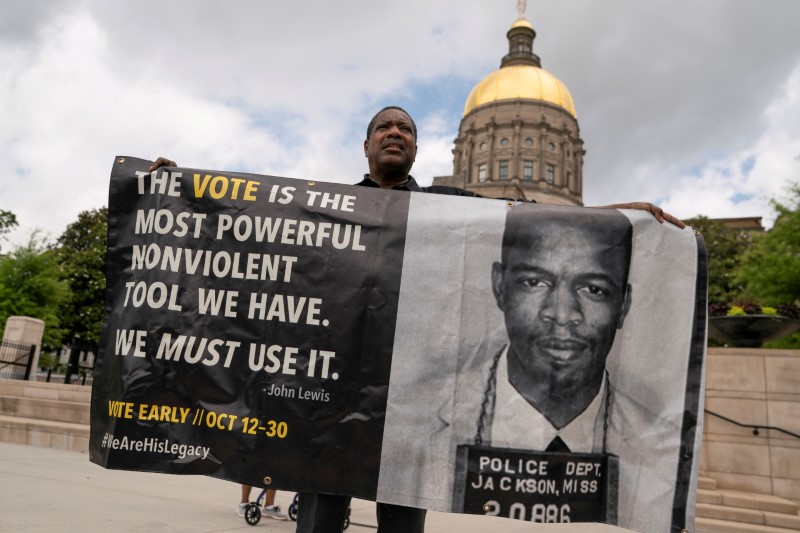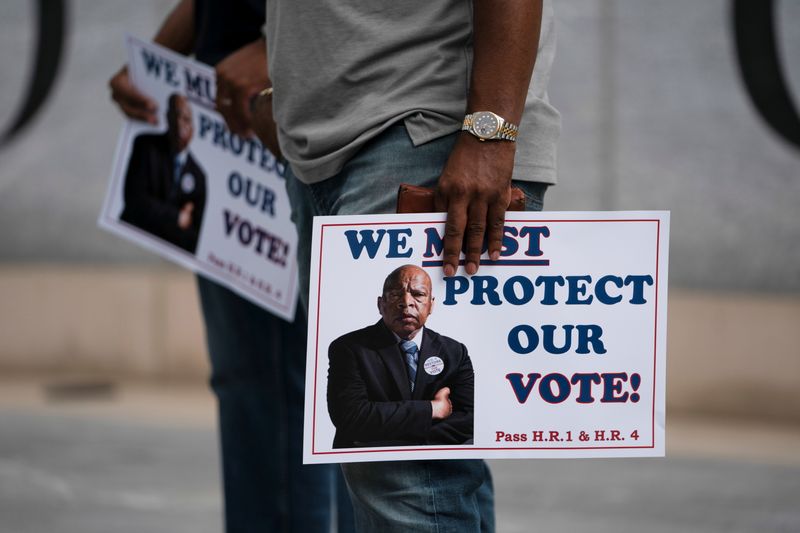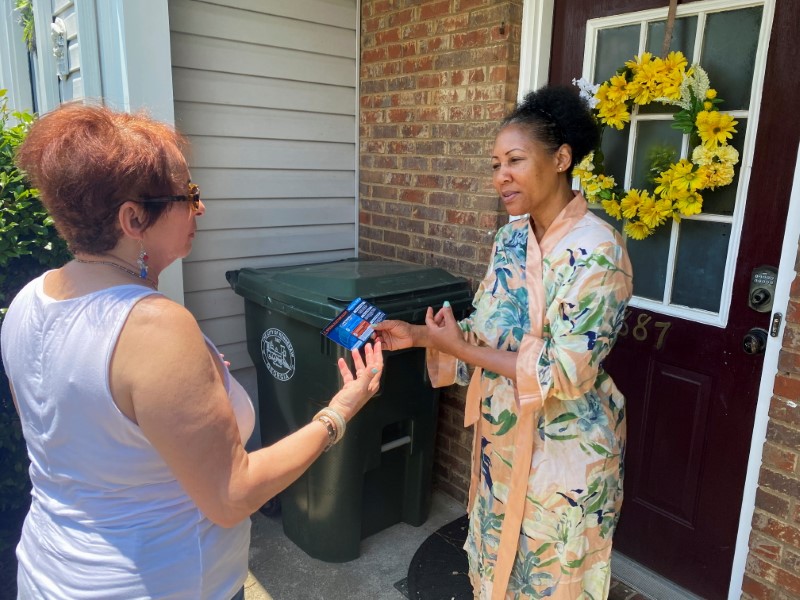MACON, Ga (Reuters) – Democrats and their allies are mounting a major effort to educate Georgia voters on sweeping new voting restrictions passed by the state’s Republican-led legislature ahead of next year’s crucial U.S. Senate and congressional races.
Volunteers are alerting Georgians to stiffened rules for mail ballots, urging early in-person voting instead. They’re handing out leaflets, sending texts and speaking in churches to warn of vanishing drop boxes and reduced voting hours. They are knocking on doors, visiting high schools and meeting with parole officers to register new voters, including young people and ex-offenders.
The push is focused heavily on minorities, particularly Black voters, who were key to Democrat Joe Biden’s narrow win in Georgia and victories for two Democratic U.S. Senators in run-off contests in January. Voting-rights advocates say Black voters are most likely to be impeded by the new law.
“The machinery is already moving” to mobilize voters, said John Jackson, chair of the DeKalb County Democratic Committee. The majority-Black county includes part of Atlanta.
The early drive underscores Democrats’ recognition that there may be little they can do to stop voting-rights rollbacks being pursued in Republican-controlled states across the country – curbs driven by false claims from former Republican President Donald Trump that election fraud robbed him of a second term.
Democrats and voting-rights groups have filed multiple lawsuits in an effort to overturn new laws in Georgia and elsewhere, but success isn’t guaranteed. At the federal level, Democratic lawmakers have pushed for legislation to protect voting rights nationwide, an effort effectively killed this month when U.S. Senator Joe Manchin of West Virginia, a crucial swing vote in the divided chamber, said he won’t support it.
What they can control, party strategists say, is their own efforts to educate and motivate voters to respond to one of the biggest voting-rights rollbacks in decades, Democrats say.
Georgia’s 98-page Election Integrity Act, also known as SB 202, was signed into law by Republican Governor Brian Kemp in March. It takes particular aim at mail balloting, which is especially popular with Democrats: Roughly a quarter of Georgia voters returned absentee ballots for November’s election, with 65% of those backing Biden.
The legislation slashes the number of ballot drop boxes in Georgia’s most-populous, heavily minority areas and reduces the hours voters can use them. It halves the time to request an absentee ballot to three months, and for the first time requires voters who use them to include proof of identity.
To see major changes under the law, click
Kemp told Reuters the new law would ensure “secure, fair and successful” elections in Georgia. He accused Democrats of pushing a false narrative of voter suppression. “We didn’t pass the bill to benefit one side or the other,” he said. “This bill makes it easy to vote and hard to cheat.”
Democrats counter that two Republican-led recounts of Georgia’s 2020 results turned up no evidence of widespread fraud. Republican Secretary of State Brad Raffensperger called the state’s process the most “secure and trustworthy” in Georgia history.
The sparring signals Georgia’s importance in determining which party ends up with control of Congress next year; Democrats currently hold the U.S. House of Representatives and the Senate by whisker-thin margins.
Newly elected Georgia Senator Raphael Warnock, who filled a retirement vacancy, must run for his seat again next year. Three Republicans have already lined up to challenge Warnock, Georgia’s first Black senator and the senior preacher at Atlanta’s historic Ebenezer Baptist Church.
“The dangers of the partisan voter suppression efforts we’re seeing, in Georgia and across the nation, are not theoretical,” Warnock told Reuters in a statement.
Many Democrats predict Stacey Abrams, a Black woman and voting-rights activist, to run a second time against Kemp for governor, a matchup she lost in 2018.
Abrams declined to comment. Her spokesperson referred Reuters to a recent public statement by Abrams that she won’t decide anytime soon.
Warnock and Abrams are wildly popular among Georgia’s Black voters, who account for a third of the state’s electorate. Democratic messaging that Republicans have surgically targeted Black Georgians with voting barriers is likely to energize them, says political scientist Daniel Franklin, professor emeritus at Georgia State University.
“People react more to something being taken away from them,” Franklin said, predicting Republicans would regret riling the Democratic base.
Campaign money is pouring into Georgia. Warnock raised $5.7 million between early January and March 31, the highest-ever quarterly tally for any Georgia U.S. Senate candidate in a non-presidential year, his campaign said.
BLACK CHURCHES FIRED UP
Faith leaders and activists pressured large Georgia-based companies to speak out against the new law. They prayed and left water bottles for lawmakers at the state capitol to protest the legislation’s ban on offering food or water to voters within 150 feet of a polling station. Photos of lengthy queues at Georgia polling places in minority areas filled social media last year.
“The long lines were real and people were passing out,” said Shavonne Williams, organizing leader in Georgia for Faith in Public Life, a network of Black rural churches.
Williams said her group plans to hand out food and water just outside the 150-foot boundary at polling places.
Saira Draper, voter protection director for the Georgia Democratic Party, said officials have set up a hotline in seven languages to answer questions about the new law, and are designing a guide to text to voters highlighting key changes. She said hundreds of volunteers are urging voters to apply for a free state voter ID.
They’re also pressuring officials to continue offering voting on two Sundays prior to Election Day, a popular day for “souls to the polls” events at Black churches. Each of Georgia’s 159 counties decides whether to permit Sunday voting. Getting them to allow it is “part of our challenge,” Draper said.
Georgia’s Black Christians, meanwhile, have shifted into battle mode. One of their leaders is Bishop Reginald Jackson, who oversees more than 500 Black African Methodist Episcopal (A.M.E.) churches across the state.
In late May, he gathered about 150 Black pastors in a conference room in Macon, Georgia to lay out the stakes. “Brothers and sisters, our democracy is really at risk,” Jackson told the assembly. “We need to begin to plan now” for 2022.
Jackson told Reuters he will soon send an “Operation Voter Turnout” plan to church leaders, with the goal of getting 75% of eligible Black voters to cast ballots in early voting next year. He estimates 400,000 voting-age Black Georgians didn’t vote in 2020, a figure he wants to shrink.
A draft of the plan, seen by Reuters, calls on each church to form a turnout committee to educate congregants about SB 202 and the importance of voting early. Church members will be asked to persuade 10 additional people to vote. Pastors are urged to talk about the effort every Sunday until the November 2022 elections.
‘DISHEARTENING’
In Cobb County, an affluent, predominately white suburb northeast of Atlanta that has swung heavily Democratic in recent years, party officials said they’re using a June 15 special election for a state House seat as a test-run for their turnout strategy for 2022.
In November’s contest, nearly 40% of the votes cast in Cobb came via mail ballots, compared to less than 10% in 2018, according to Jacquelyn Bettadapur, chair of the Cobb County Democratic Committee. In light of the new, tighter time frame to request mail ballots, and fewer drop boxes to put them in – there’s just one in Cobb County for Tuesday’s contest, down from three in November – party officials are urging early, in-person voting instead, she said.
In late May, Democratic volunteers Eileen Lichtenfeld and her sister Roberta Goldman went door to door, where they encountered Miraca Jones, 54, a registered nurse. They explained the impact of the new law, including the reduction in drop boxes.
“It’s very disheartening,” said Jones, a Democrat.
She vowed to vote early, in person.
(Reporting by Tim Reid in Macon, Georgia and Nathan Layne in Wilton, Connecticut; editing by Soyoung Kim and Marla Dickerson)

























